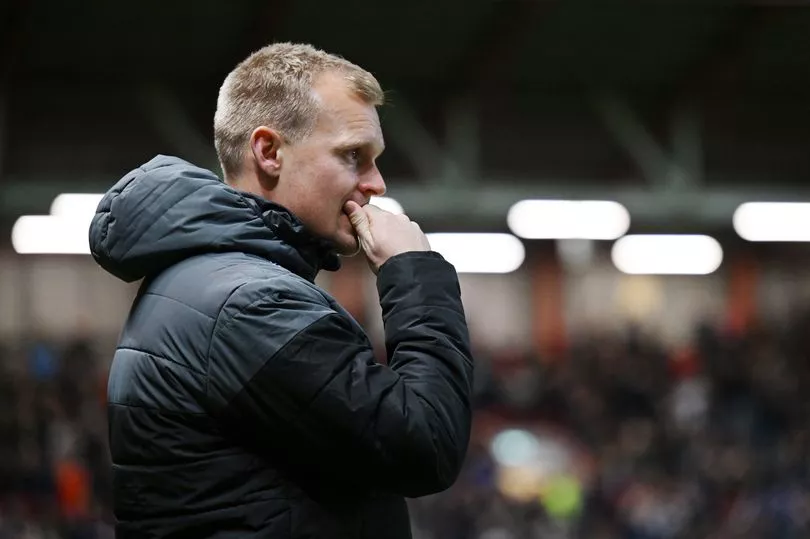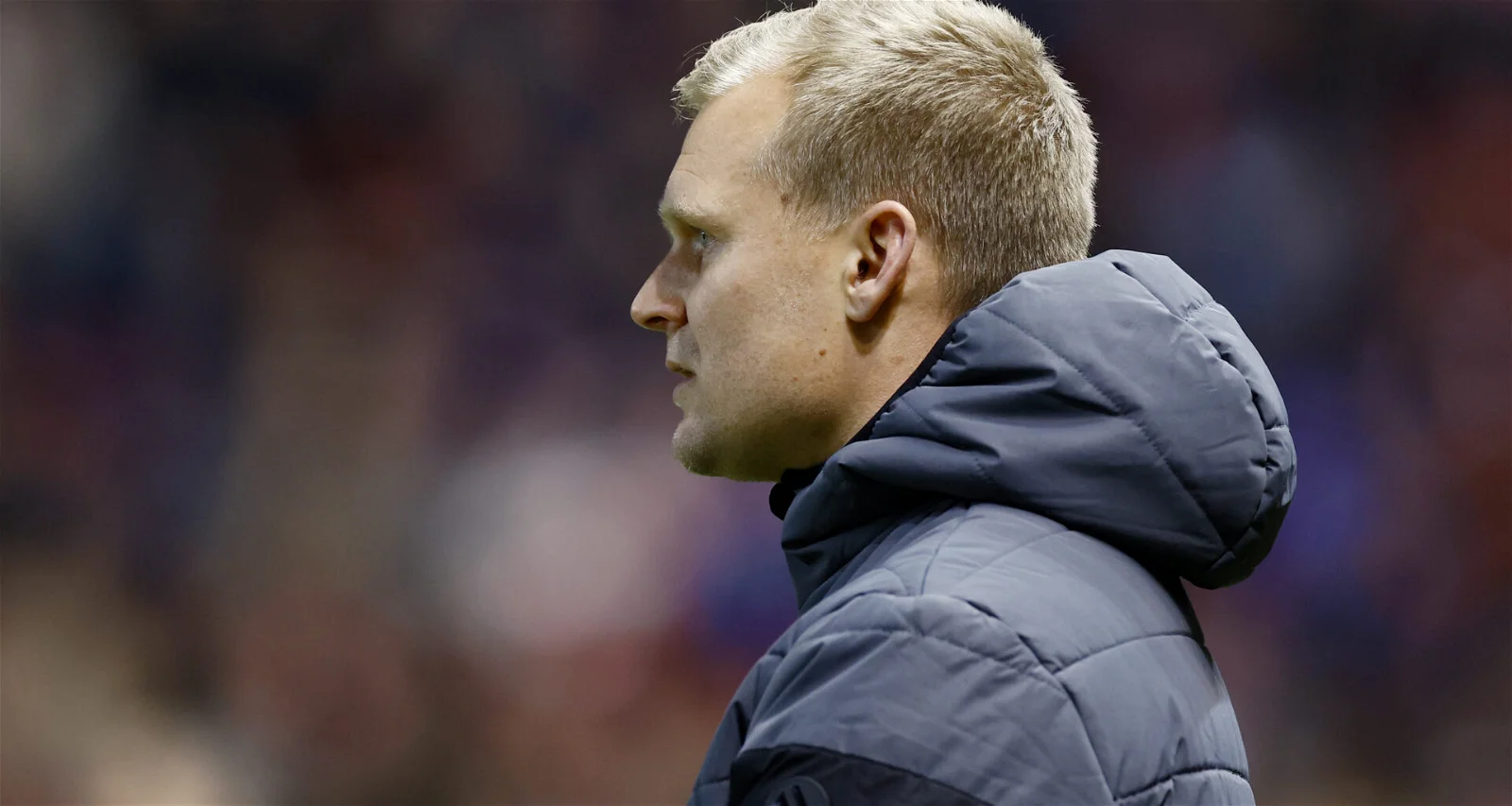The head coach of the Robins will now attempt to address some familiar concerns at the High Performance Centre after Bristol City’s performance against QPR.
Head coach Liam Manning has given the Bristol City team an extra day off so they can recover mentally before turning their attention to Sheffield Wednesday on Saturday and the chance to make up for the loss to QPR.
The Robins’ performance at Ashton Gate was terribly disappointing as they lost 1-0 to a Rs club that had only kept one clean sheet in their previous eight games. The crucial goal came from Ilias Chair in the first half, but more concerning was City’s incapacity to penetrate the opponents.
After the game, Manning was eager to reiterate that he wasn’t using weariness or fatigue as an excuse because, in the end, City performed poorly in a lot of areas. However, he did acknowledge that an additional day of rest and recovery should have the desired effect.
The intensity of the schedule has affected not only general preparation but also time away from the training ground for the players, as they are frequently called in for a recovery session at the High Performance Centre in the immediate aftermath of a match. In 2024, City have played 12 matches in 48 days, five of which have been away from home. For context, Saturday’s opponents have played nine, with just three on the road.
In contrast to Southampton, where City appeared stronger and more fit at the end of the match, there was a noticeable decline in intensity and speed against QPR in the second half. This may have been caused by the opposition, but the hosts definitely appeared lethargic and a touch tired while in control.
The timetable does lessen somewhat for City’s players, who will meet back at the HPC on Tuesday to start training for the weekend trip to Hillsborough. They will then have a full week off before hosting Cardiff City at Ashton Gate. Their sole midweek match in March is the trip to Ipswich Town on the first Tuesday of the month; the international break falls towards the end of the month.
Manning remarked, “People coming on and people starting weren’t at the races collectively.” “We played the seventh game in twenty-three days, and it was a really demanding time. We didn’t have the same intensity and excitement as we had in the previous two games.
They return on Tuesday after taking Sunday and Monday off. A few days, in my opinion, will be beneficial and necessary. We have been playing a game every four days for the past two and a half months, not only the last 23.
“The boys have been amazing; out of 22 games, this is maybe the second one where you’re going. However, in terms of performance, it wasn’t up to par. Being at a continuous 20 out of 22 is therefore difficult and demanding, but it’s also not a justification.
“Manchester City repeatedly engages in that behavior. It makes sense that they are the best team in the world, but whether you play once a week or twice, you still need to aim to perform at a high level if you want to succeed. We have things to learn, things to grow better at, and things to get better at.
Without a doubt, one of the areas that needs work will be how City exploits teams that are content to give them the ball, as opposed to allowing the Robins to attack in transition, like they did against Southampton and Middlesbrough.
Eight games under Manning where City have had 50% or more of the ball have resulted in four draws and four losses, exposing a glaring weakness in this team that was also noted as an issue under Nigel Pearson’s management. Given that Wednesday has an even lower average of 42.4 percent possession this season than QPR (45.4), it will probably be put to the test once more on Saturday.
It seems that they developed a transitional approach against Boro, where they had 30% of the ball, and Saints, 33%, thus forcing the change on Saturday with little time spent on the practice field beforehand proved to be too much. This was felt more acutely in the second half, when the hosts were dependent on Max O’Leary to limit the deficit to just one goal. The Robins had 60.5% of the ball, but only three shots on goal compared to the R’s nine.
“It’s just a different expectation, in terms of we’re going out to have 55-60 per cent of the ball, rather than everyone’s quite content to play Middlesbrough and Southampton with 30-35 per cent; so there’s a different expectation in terms of how the game is going to be controlled and looks,” Manning added.
“I’ll welcome time on the training pitch, you do have to learn to play the structure against a block. What we’ve done well is press, learn to block and defend like we did at Middlesbrough, play on the counter and build-up – there have been so many positives. We need time on the grass now to shift the control we’ve shown at times into chances and goals.”
Manning said to BBC Radio Bristol after the game that the “million dollar question” is how to put an end to City’s inconsistency. When factoring in the FA Cup ties, City has generally done well against teams of a higher caliber or those that are further up the league table and pyramid. However, before Tony Mowbray took over, the team lost to QPR, Millwall, Huddersfield Town, and Birmingham City—all of which are battling relegation this season.
These next two weeks give Manning a window to better execute his ideas because he will have more time for preparation and can work with the players consistently at the HPC rather than having to travel and/or recover.
When discussing City’s failure to win games when controlling the ball, Manning said on BBC Radio Bristol, “You don’t change that overnight, it’s something that we’ve got to work hard to shift.”
Tommy Conway’s chance is just one example of how we practiced playing the organization that was really there to damage them. There are many other parts to that as well, such as the mindset and understanding that led to the set-up.
“Knowing how to accomplish that and how to get the details correct is key. Not that it was good enough; it just gets really hard when you don’t have time to practice, teach the boys how to do it, and explain to them what it feels like while you’re doing it.
“When something is different, it’s about managing the pressure and expectations.” When you own 55–60% of the ball, the pressure changes. You must demonstrate a different kind of discipline and determine if you can move the ball quickly enough across the pitch. We took three or four touches rather than just one or two, which is what we didn’t do.
“The difficulty arises when you are unable to work on it. Before and after the match, there was a pattern that stands out. Birmingham comes to mind when considering how to convert their dominance into goals while ensuring that the opposition is pinned down.
“You have to put in the effort; the program we’ve been using makes it challenging to coach and learn. However, it’s not all tactical; the fundamentals and behaviors weren’t what they should have been.
“We can talk about tactics but if you lift your pass, or you put it behind someone and you don’t get the little details right then the tactical stuff, to a certain extent, becomes irrelevant.”



